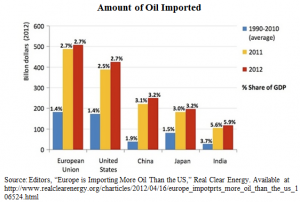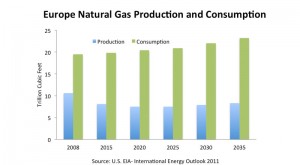Russian Energy Out, American In
The political climate between Russia and the rest of the world has deteriorated significantly in recent weeks. However, unlike the war methodology of the early world, economic sanctions are the new way to hurt countries.
Russia’s economy is largely dependent on natural gas and oil, producing nearly of 70% of total exports in 2012, 32% of which was crude oil. The majority of these exports go to Europe, as they are wholly interdependent on Russian energy. In order to meet the demands of a full Russian blockade on energy, the European Union would need to invest 215 billion dollars to meet their own energy demands. Even though there is a vast natural gas market to be explored by U.S. companies, the required approvals could take as long as 2019. The companies who have submitted approvals to congress are still having to wait the required times for natural gas.
The closest to exporting is the company, Cheniere Energy, Inc, who can begin exporting as early as 2016. Even if U.S. companies were able to export crude, it would serve only as a motivator because it would take just as long to increase production to sustainable levels since the U.S. still imports 2.7% of its GDP in oil. The European Union is almost identical in its imports. However, if the U.S. were to come together with Mexico and Canada a strong partnership could be created a lot sooner.
Congress needs to act quickly on allowing permits because of the European Union’s plan to become energy independent. If the U.S. can begin exporting oil and natural gas quickly then the E.U. would be allowed several years of planning before making risky investments. It is also extremely important to note that while natural gas can be moved by pipeline easily to countries such as Mexico and Canada; there currently exists no infrastructure for exporting to Europe. This makes things even more complicated as it would require billions in research and development.
While it may seem farfetched, the possibility of energy exports to Europe has increased in recent weeks. There is currently a bill proposed that would automatically approve all received natural gas export projects. Since Europe does not have free-trade agreement with the U.S., it would open up the market to all approved companies. Europe has a mounting deficit in energy production, and with Russian relations rocky, the outlook for US companies looks extremely promising. There is a strong push in the U.S. to end the 40 year ban on crude oil, which is the most efficient way to handle the mounting European energy crisis. It would allow a stronger partnership between allied countries and increase the amount of crude production in North America. It would also create the incentive needed to allow U.S. companies to explore and produce for global markets, rather than just the United States.
There is a strong fear that ending the ban would increase domestic prices but this is not true. Not only would ending the ban create nearly a quarter million jobs but there would be a strong push to increase production and supply, which would level prices in the long term.

